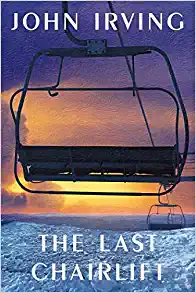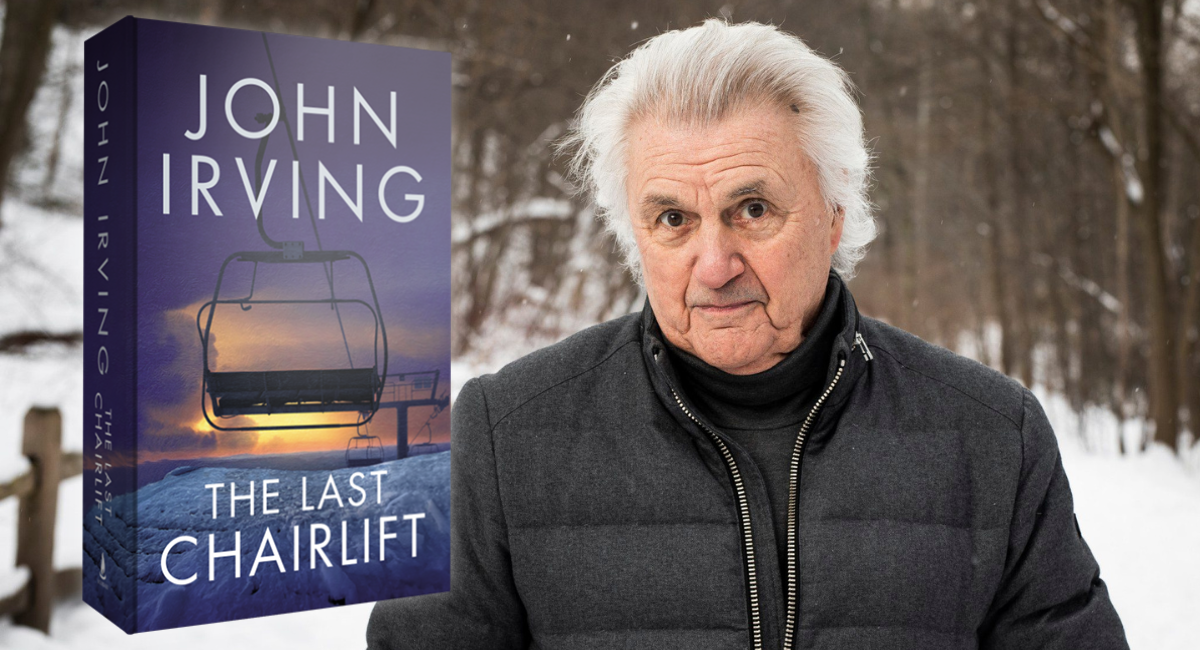The Last Chairlift by John Irving
Family matters. Size matters. Actually, pretty much everything matters, in the world according to John Irving.
For readers fanatical about his work or those who might see him as an acquired taste they haven’t yet acquired, I’ll let you in on a not-so-secret secret: John Irving is one of the great literary geniuses of our time – or any time.
Whether you agree with his opinions, he seems to have them on practically anything and manages to weave them into his books, either as the main plot theme or one of the many threads of consciousness he so masterfully includes that seemingly have no consequence (until they do – or don’t).
It is this ability to segue in a million directions that makes Irving’s storytelling so incredible – especially for me, a “plot guy” by definition who is totally captivated by Irving’s going off-plot. Because of this quirk of Irving’s, I’ve told friends they have to be in the right state to read Irving – he’ll spin you around like a rinse cycle, forcing you to think hard to stay on course but take you on a plethora of brief excursions into marvelous writing.
When I heard Irving was about to release his first novel in seven years, The Last Chairlift (Simon & Schuster), I jumped at the chance to get an advance copy. Through his early works, I had found my literary soulmate in terms of his style, humor, themes and wavelength — think The World According to Garp, A Prayer for Owen Meany, A Son of the Circus and The Cider House Rules.
Then the close-to-900-page volume showed up on my desk. Not to be intimidated by this brick-like structure, I was ready to embrace it.
ALL IN THE FAMILY
Family matters. Big-time in Irving’s work.
There’s often a quest to find a key missing parent, like the father in Until I Find You and again here in The Last Chairlift. Those searches are always aided – if not stymied – by strong mothers. In the most recent case, it’s Rachel, a former world-class-wannabe skier whose tryst with someone at the Hotel Jerome in Aspen in the ‘40s produced Adam, our narrator and protagonist, who eventually becomes a writer (of course).
The family cast is supported by an array of unusuals, among them: a grandfather who may or may not have been a school dean, who no longer speaks, and crawls around in diapers; two doting aunts quick to disapprove of Rachel’s unorthodox lifestyle; their husbands, whose first instincts are to laugh at anything; and Adam’s lesbian cousin Nora, whose opinions and observations guide him through his formative years.
And why would his aunts (his mother’s sisters) cast aspersions on his mother’s behavior? Well, for starters she is married to an Exeter English professor who dresses in her clothes, and she sleeps with a former female ski colleague when she is not sleeping between her son and someone else.
Irving has always been ahead of his time in writing about sexual freedoms, introducing homophobic and transgender characters decades ago, before those words entered our mainstream vocabulary. There’s nothing groundbreaking here for The Last Chairlift, especially for those already accustomed to such dialogue from the author, but he continues his practice, starting with Elliot and following with Little Ray’s tendencies. Referring to her ski-partner lover, she tells Adam, “Molly and I are actual sexual minorities, sweetie – women like us get treated even worse than unwed mothers.”
And why is Little Ray so guarded about the identity of Adam’s father? As Adam tries to solve that mystery, shrouded within this most unconventional family, he is introduced to a series of ghosts whose meaning may serve as clues.
Size matters. Rachel is small, and the topic comes up throughout. She is known as Little Ray for her excessive shortness, and she marries that English professor, Elliot Barlow, who happens to be shorter than her and can barely navigate a steering wheel. Later, one of Adam’s friends from the school wrestling team, Zimmermann, introduces a short girlfriend into the story. Does shortness matter here? Is it a coincidence that Zimmermann is infatuated with Little Ray and therefore playing out a fantasy? What is Irving getting at here?
PARALLELS WITH MOBY-DICK
Everything matters.
Early in The Last Chairlift, Irving makes reference to Moby-Dick. Adam explains that in the three years it took his Nana to read it to him when he was only 10 (at the start), it made him want to be a writer and “it essentially shaped and screwed up the rest of his life.” That’s Adam, of course – not our author. Or, well, uh, take your pick.
Then there’s the matter of Adam interrupting his grandmother’s telling of the story with hundreds of questions. But as he explains it, “I was interested in all the wrong things – such as whale vomit, or what makes whales sick in the first place.”
This is no throwaway. This is the genius of Irving. This is one of those side anecdotes (I could provide countless ones) that are so well written, explained in detail, laced in sarcasm when appropriate but not always, and so well researched and enjoyable. It makes readers ponder: Why did he go to the trouble to spend so much time investigating this subject to stick it in here at all? Irving’s favorite projects, he said in a recent interview, are the ones that force him to learn and to dive into areas of which he knows very little.
Irving’s writing is an abundance of anecdotes like that – which add so much color if not clarity to his stories. It’s why I, the plot guy, keep coming back for more of this storytelling that has nothing to do with the plot. If I reeled off the specific topics, it might be a turnoff – but believe me, that’s not the way to read them and treasure them.
THE MYSTERY OF DISCOVERING ADAM’S DAD
Meanwhile, the plot is no small sister to Irving’s literary devices and digressions. So just why won’t Little Ray reveal the identity of Adam’s father?
While the book follows Adam through his school years, his relationships, his overall coming of age, and his adulthood, he’s perplexed by the mystery before him. He writes, “Even if my father’s identity and story were painful to my mother – even if their relationship had been so sordid that any revelation of it would shed a continuous, unfavorable light upon both my parents – wasn’t my mother being selfish not to tell me anything about my father?”
“One day, I always thought, she would tell me about it – when I was old enough to know the story. It was, apparently, the kind of story you had to be ‘old enough’ to hear.”
Anyone “old enough” to remember and appreciate John Irving’s early work will not be disappointed with The Last Chairlift. Its 900 pages might seem like a heavy lift. But so what — isn’t it normal to put on some weight over the years? For me, when it comes to John Irving, just like an old friend you haven’t seen in a long time, if the bond is there, the conversation picks up right where it left off.
About John Irving:
John Irving was born in Exeter, New Hampshire, in 1942. His first novel, Setting Free the Bears, was published in 1968, when he was twenty-six. He competed as a wrestler for twenty years, and coached wrestling until he was forty-seven. Mr. Irving has been nominated for a National Book Award three times — winning once, in 1980, for his novel The World According to Garp. He received an O. Henry Award in 1981 for his short story “Interior Space.” In 2000, Mr. Irving won the Oscar for Best Adapted Screenplay for The Cider House Rules. In 2013, he won a Lambda Literary Award for his novel In One Person. An international writer — his novels have been translated into more than thirty-five languages — John Irving lives in Toronto. His all-time best-selling novel, in every language, is A Prayer for Owen Meany. Visit https://john-irving.com.





